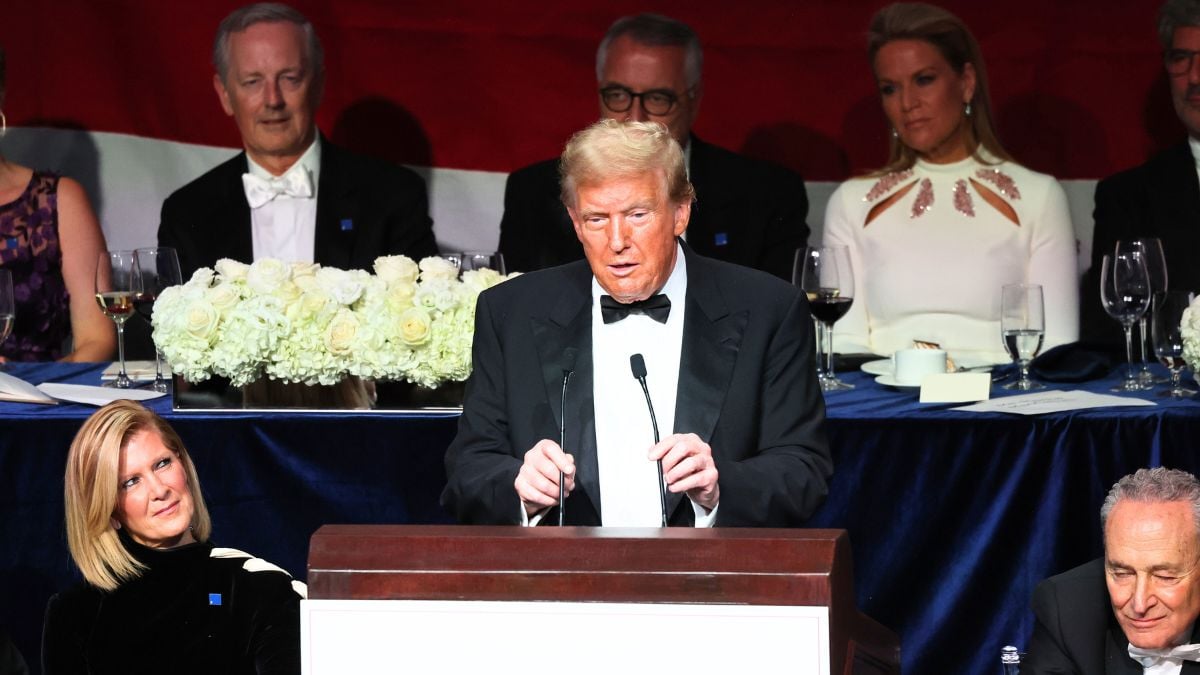Social media has been abuzz with news about Donald Trump’s speech at this year’s Alfred E. Smith Memorial Foundation Dinner and Vice President Kamala Harris‘ decision to skip the event. But why is this dinner important? Plus, who attended it?
The Al Smith dinner, named after the first Catholic presidential nominee in U.S. history, has been a staple of the election season for decades. Typically, it serves as a platform for presidential candidates to showcase their lighter side, trading good-natured jabs and self-deprecating humor.
This year’s dinner took place amid a highly contentious political climate. With the 2024 presidential election looming, tensions between Republicans and Democrats have been running high. The dinner’s organizers faced the challenge of maintaining the event’s traditional bipartisanship spirit while accommodating current American politics’ polarized nature.
The most notable aspect of this year’s Al Smith dinner was the contrasting approaches taken by Donald Trump and Kamala Harris. Trump attended the event in person, delivering a speech that many observers described as more reminiscent of a campaign rally than the usual lighthearted roast. His presence at the New York Hilton Midtown was particularly significant given his ongoing legal battles in the city.
In contrast, Vice President Harris opted for a pre-recorded video message instead of attending in person. Her decision to skip the event in favor of campaigning in battleground states broke with the long-standing tradition of presidential and vice-presidential candidates attending the dinner in election years. Harris’ video included a comedic skit with former Saturday Night Live cast member Molly Shannon, in which Shannon reprised her ‘Superstar’ Catholic schoolgirl character, Mary Katherine Gallagher.
Who was at 2024’s Alfred E. Smith Memorial Foundation Dinner?
While the complete guest list of the event remains undisclosed, several high-profile attendees were noted at the white-tie affair. Former First Lady Melania Trump made a rare public appearance alongside her husband, drawing attention from the media and fellow guests. Her presence was particularly noteworthy given her limited involvement in Trump’s campaign.
New York City Mayor Eric Adams was also in attendance despite facing his own legal challenges. Trump addressed Adams’ situation during his speech, saying, “They went after you, mayor,” referring to Adams’ five-count federal indictment on bribery and fraud charges. Trump added, “But you’re going to win,” and “I don’t like what they do.” These comments reportedly led to Adams’ early departure from the event.
Other notable attendees included New York Attorney General Letitia James, whose office has been engaged in a high-profile civil fraud case against Trump; Robert F. Kennedy Jr. and his wife, actress Cheryl Hines, who recently supported Trump’s candidacy; Senate Majority Leader Chuck Schumer; House Speaker Mike Johnson; and New York Governor Kathy Hochul.
The reactions of these attendees to Trump’s speech varied. Some appeared visibly uncomfortable at times, particularly when Trump’s remarks strayed into more controversial territory. For instance, Trump made a joke about transgender women that echoed his frequent mocking of trans athletes on the campaign trail, and at one point even used profanity, saying about former New York Mayor Bill de Blasio, “To be honest, he was a terrible mayor. I don’t give a s—- if this is comedy or not.”
In short, Trump used a supposedly light-hearted event to spread his usual egotistical nonsense. Meanwhile, Harris refused to break bread with an adversary who refuses to take politics seriously — which is understandable but still contributes to the current polarization climate. The question remains if future Al Smith dinners will continue to serve as a moment of levity and unity or if this year has completely changed the event’s nature.
